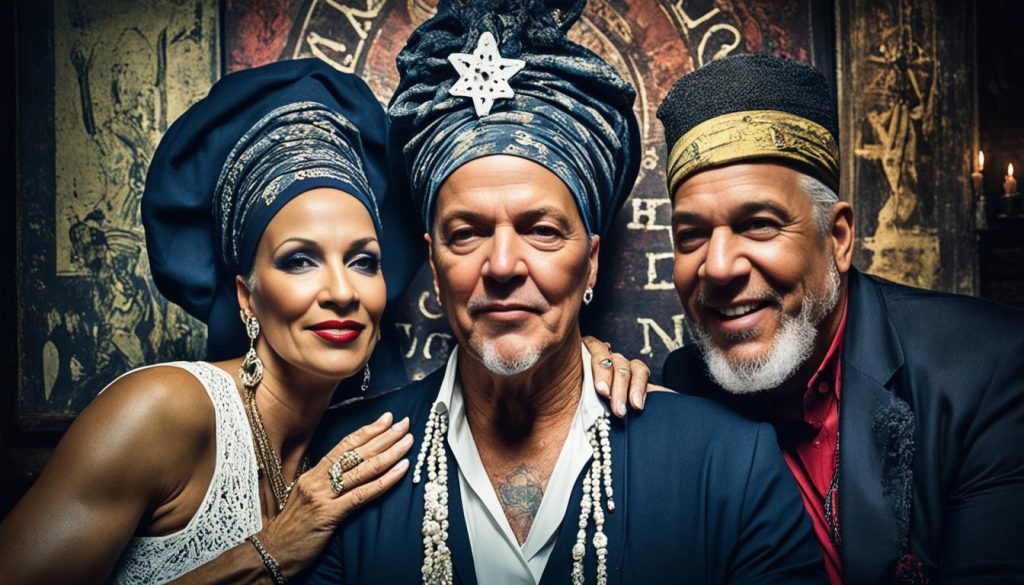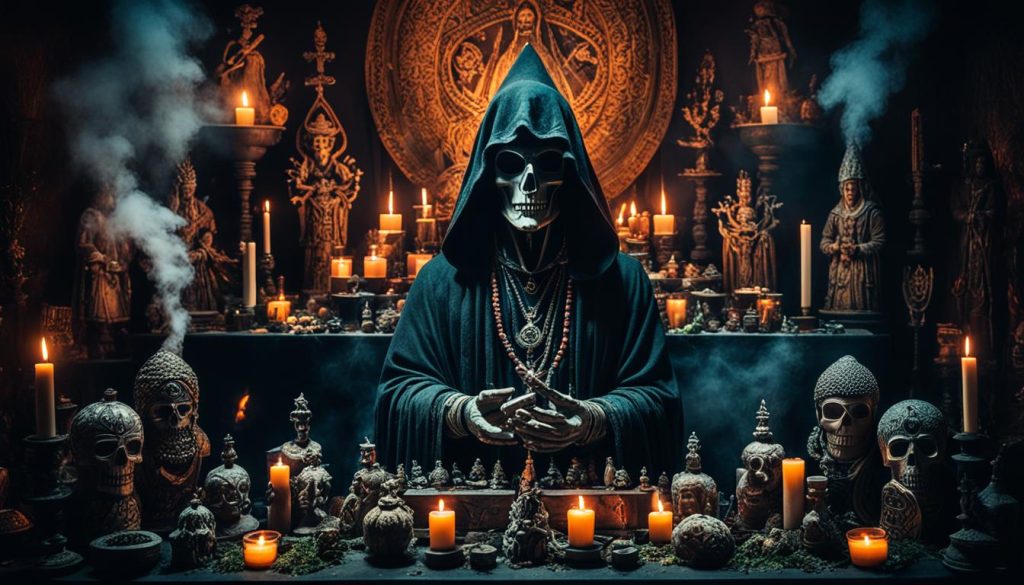Welcome to the vibrant and captivating city of New Orleans, where history and the occult intertwine to create a mystical landscape like no other. In this article, we invite you to delve into the enigmatic world of black magic and uncover its hidden secrets in the heart of New Orleans.
With its rich historical background and deep spiritual roots, New Orleans has long been associated with the occult. From ancient rituals to modern practices, the city has become a haven for those intrigued by the mysteries of the occult and the allure of black magic.
Immerse yourself in the intriguing history of black magic in New Orleans, where the veil between the supernatural and the mundane is thin. Discover the origins of voodoo and its fusion with Catholicism, giving birth to the unique and powerful tradition of New Orleans Voodoo. Explore the lives of famous voodoo personalities like Marie Laveau and Dr. John, who influenced the development of voodoo practices in the city.
Experience the sights and sounds of voodoo practices and celebrations that still take place today. From mesmerizing rituals to the creation of gris-gris dolls and talismans, New Orleans offers a glimpse into a world of spiritual connection and empowerment. Visit the Voodoo Spiritual Temple and the New Orleans Historic Voodoo Museum to deepen your understanding of this ancient tradition.
Unravel the mysteries of black magic New Orleans and embark on a journey that will awaken your senses and expand your understanding of the occult. Join us in uncovering the hidden secrets of this fascinating city and discover a world steeped in history, mystique, and boundless possibilities.
The Origins of Voodoo in New Orleans
Voodoo, synonymous with New Orleans, has deep roots in the city’s history. It was brought to Louisiana by enslaved West Africans who merged their religious rituals with the practices of the local Catholic population. This fusion gave rise to New Orleans Voodoo, also known as Voodoo-Catholicism. The core belief of this religion is that spirits, rather than a single God, interact with daily life. Voodoo queens and kings held significant spiritual and political power in 19th-century New Orleans.
Voodoo in New Orleans emerged as a result of the cultural exchange between the enslaved West Africans and the Catholic community. Enslaved Africans, forced to abandon their native traditions, found solace in aspects of Catholicism that mirrored their own spiritual practices. By blending elements of their ancestral religions with Catholicism, they formed a unique and syncretic belief system known as Voodoo-Catholicism.
- The enslaved West Africans incorporated Catholic saints and prayers into their rituals, attributing their traditional deities to these Christian figures.
- They relied on spiritual leaders known as voodoo queens and kings, who acted as intermediaries between the human and spirit worlds.
- Voodoo-Catholicism emphasized the importance of ancestor worship and the belief in the interconnectedness of all beings.
- Enslaved Africans and free people of color formed secret societies and religious congregations, such as the Congo Square gatherings, where they could practice their faith without persecution.
19th-century New Orleans was a thriving hub of Voodoo-Catholicism, where spiritual practices permeated all aspects of daily life. The voodoo queens, such as Marie Laveau, held immense influence and were sought after for their healing, divination, and spellcasting abilities. They not only provided spiritual guidance to their communities but also played an integral role in challenging the oppressive systems of the time.
Famous Voodoo Personalities and Practitioners
When it comes to voodoo in New Orleans, two names stand out as legendary figures – Marie Laveau and Dr. John. Marie Laveau, known as the voodoo queen, was a highly respected and influential figure in the city. As a devout Catholic, she seamlessly blended voodoo practices with her faith, captivating both believers and skeptics alike.
Marie Laveau was not only renowned for her mastery of voodoo, but also for her acts of charity, healing abilities, and spiritual guidance. Many sought her assistance for various needs, from love and luck to protection and revenge. Her reputation as a powerful voodoo queen spread far and wide, solidifying her status as an iconic figure in New Orleans’ voodoo history.
Dr. John, also known as Bayou John, was another prominent figure in New Orleans voodoo. Renowned as an excellent healer and fortune teller, Dr. John’s abilities were widely sought after by both locals and visitors to the city. He was considered a voodoo king, possessing the knowledge and skill to navigate the spirits and divine the future.

Marie Laveau and Dr. John played vital roles in the development and spread of voodoo practices across New Orleans. Their influence and expertise not only shaped the city’s voodoo community but also perpetuated its rich traditions. Even to this day, their names evoke an aura of mystery and reverence, reminding us of the voodoo queens and kings who changed the spiritual landscape of New Orleans forever.
Voodoo Practices and Celebrations in New Orleans
Voodoo practices in New Orleans are a vibrant and integral part of the city’s cultural fabric. These practices encompass a wide range of rituals, including mesmerizing dance performances, soul-stirring music, powerful chanting, and even the intriguing use of snakes. Voodoo rituals serve as a connection between the spiritual and physical worlds, offering solace, guidance, and protection to those who partake in them.
One notable aspect of New Orleans voodoo is the presence of gris-gris dolls, potions, and talismans. These objects, believed to possess magical powers, can still be found in specialty stores and cherished in many households throughout the city. Gris-gris dolls, in particular, are handmade talismans that are often used to attract luck, love, or ward off negative energies.
St. John’s Eve, celebrated annually on June 23, holds a significant place in New Orleans voodoo traditions. This festive occasion is marked by both public celebrations and private rituals. Participants come together to honor their ancestors and commune with spirits, seeking wisdom, spiritual guidance, and blessings. The atmosphere during St. John’s Eve brims with awe-inspiring rituals that showcase the beauty and mystery of New Orleans voodoo.
A historic location that holds great importance in the history of New Orleans voodoo is Congo Square. Situated in the Treme neighborhood, this site served as a gathering place for enslaved Africans during the colonial era. It became a hub for cultural expression, where voodoo ceremonies, dance, and music could be freely observed. Congo Square played a vital role in preserving and promoting the traditions of voodoo in New Orleans, making it an essential part of the city’s spiritual heritage.
Modern-Day Voodoo in New Orleans
Voodoo, a powerful and mystical practice, continues to thrive in the heart of New Orleans. For those seeking to explore and experience this unique spiritual path, the city offers a range of fascinating attractions.

Voodoo Spiritual Temple
A must-visit destination for voodoo enthusiasts, the Voodoo Spiritual Temple near Congo Square is the city’s only formally established voodoo temple. Led by Priestess Miriam and Priest Oswan Chamani, this sacred space is a hub of spiritual activities, rituals, and ceremonies. Visitors can immerse themselves in the vibrant energy and engage with the rituals performed by experienced practitioners.
New Orleans Historic Voodoo Museum
To gain a deeper understanding of the history and culture of voodoo in New Orleans, a visit to the New Orleans Historic Voodoo Museum is highly recommended. Located in the heart of the French Quarter, this unique museum showcases a vast collection of artifacts, artworks, and historical relics relating to voodoo practices. From ritual tools and talismans to exhibits on voodoo queens and kings, the museum offers a captivating journey into the rich heritage of voodoo in the city.
Voodoo Shops
New Orleans boasts an array of voodoo shops where visitors can explore various products, charms, and tools related to voodoo practices. One popular store is Voodoo Authentica, which offers an extensive range of voodoo dolls, potions, and spiritual supplies. Additionally, Marie Laveau House of Voodoo provides an enchanting shopping experience, with its wide selection of voodoo-related items and personalized readings by knowledgeable staff.
Whether you’re looking to embark on a spiritual journey, learn about voodoo traditions, or purchase authentic voodoo products, New Orleans has much to offer. Step into the world of modern-day voodoo and discover the mystical practices that continue to shape the soul of the city.
Conclusion
New Orleans is a city that has captivated the imagination with its deep connection to black magic, the occult, and voodoo practices. The history that permeates its streets, the legends that unfold, and the spiritual traditions that continue to thrive make it a haven for those seeking something beyond the ordinary.
Delving into the mysteries of black magic in New Orleans reveals a tapestry woven with threads of history, culture, and spirituality. From the origins of voodoo, born from the fusion of enslaved West African rituals and Catholicism, to the famous voodoo personalities like Marie Laveau and Dr. John who shaped the path of voodoo practices, every aspect unveils a vibrant narrative.
Modern-day voodoo continues to flourish in the heart of New Orleans, with the Voodoo Spiritual Temple and the New Orleans Historic Voodoo Museum serving as gateways to understanding the intricate web of beliefs and practices. Journey through the voodoo shops, where gris-gris dolls and potions wait to be discovered, and immerse yourself in the energy of rituals and celebrations that connect the past with the present.
Unlocking the secrets of black magic New Orleans holds a transformative power. Explore the depths of its occult history, witness the beauty of voodoo traditions, and embrace the enigmatic spirit that has made New Orleans a true testament to the allure of the supernatural.